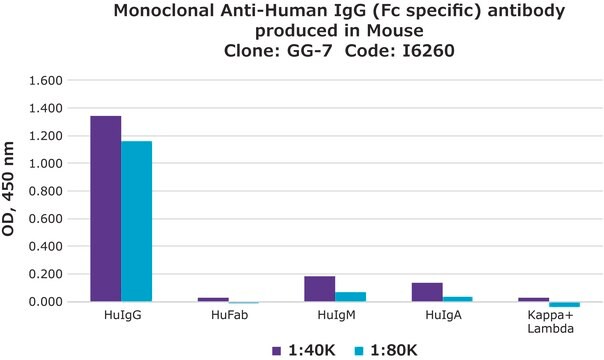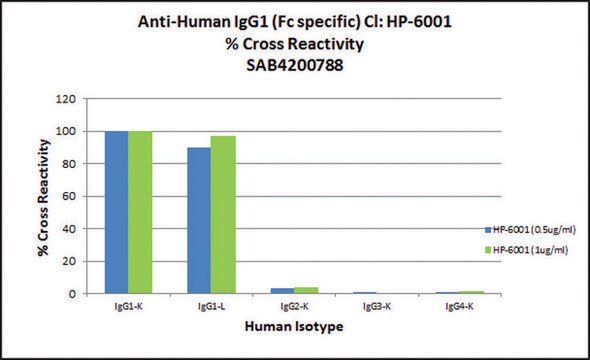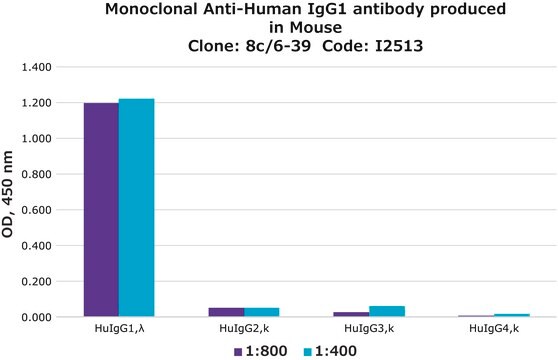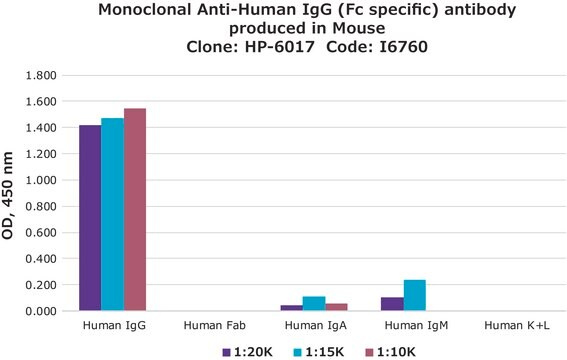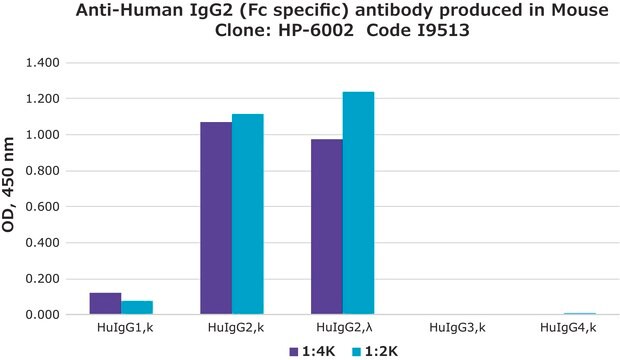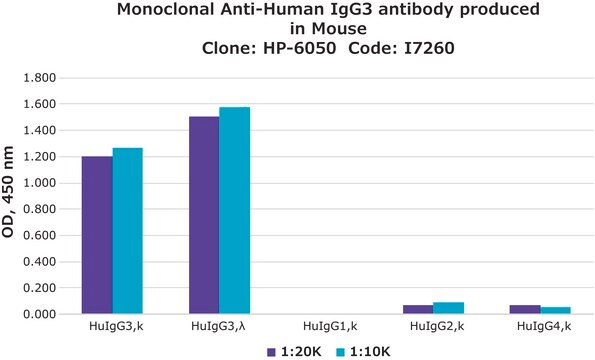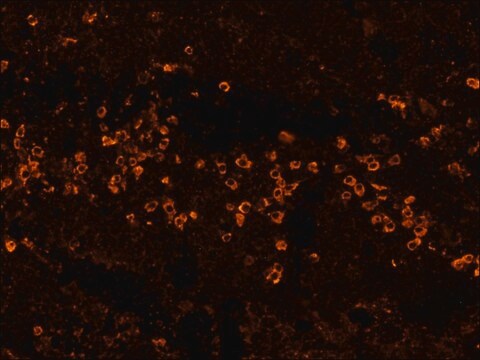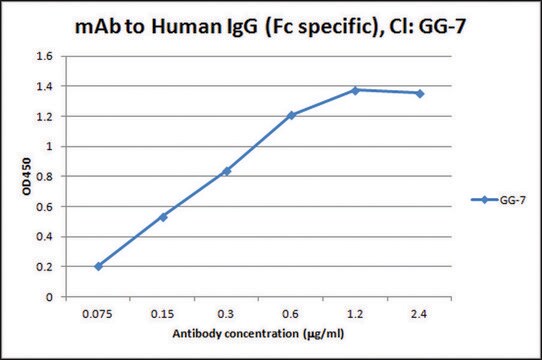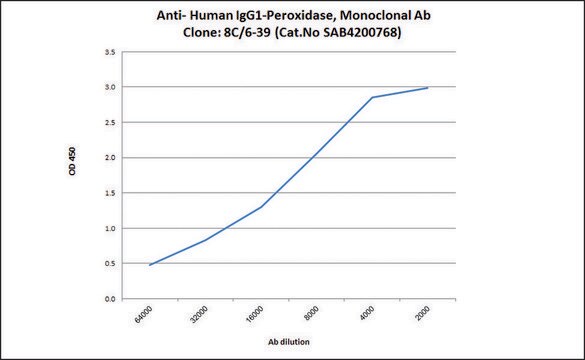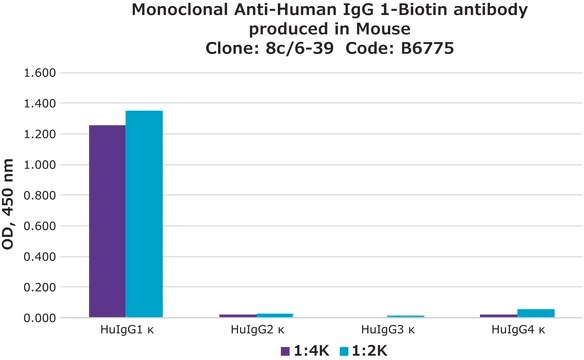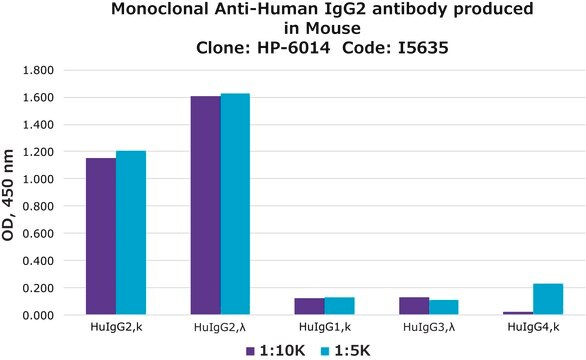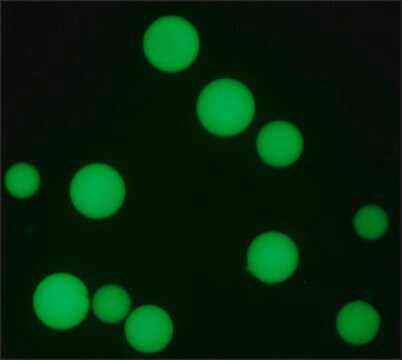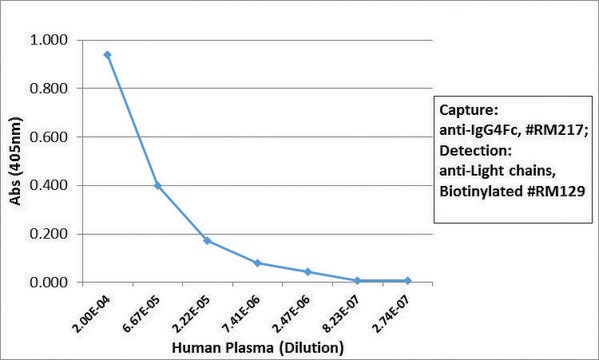I9388
Monoclonal Anti-Human IgG1 (Fc specific) antibody produced in mouse
clone HP-6001, ascites fluid
Sign Into View Organizational & Contract Pricing
All Photos(1)
About This Item
Recommended Products
biological source
mouse
Quality Level
conjugate
unconjugated
antibody form
ascites fluid
antibody product type
secondary antibodies
clone
HP-6001, monoclonal
contains
15 mM sodium azide
technique(s)
indirect ELISA: 1:3,000
isotype
IgG2b
shipped in
dry ice
storage temp.
−20°C
target post-translational modification
unmodified
General description
Human IgGs are glycoprotein antibodies that contain two equivalent light chains and a pair of identical heavy chains. IgGs have four distinct isoforms, ranging from IgG1 to IgG4. These antibodies regulate immunological responses to allergy and pathogenic infections. IgGs have also been implicated in complement fixation and autoimmune disorders
Monoclonal Anti-Human IgG1 (Fc specific) antibody is specific for an epitope in the Fc region of human IgG1 and does not detect IgG2, IgG3, and IgG4. The association constant of this antibody with its ligand is estimated to be 1x(107) L/M. This product clone has been tested for specificity using various immunoassays in the IUIS/WHO study.
Monoclonal Anti-Human IgG1 (Fc specific) antibody is specific for an epitope in the Fc region of human IgG1 and does not detect IgG2, IgG3, and IgG4. The association constant of this antibody with its ligand is estimated to be 1x(107) L/M. This product clone has been tested for specificity using various immunoassays in the IUIS/WHO study.
Specificity
Monoclonal Anti-Human IgG1 (Fc specific) is specific for the IgG1 subclass and nonreactive with IgG2, IgG3, and IgG4 in an ELISA. The antibody recognizes an epitope expressed in the Fc region of IgG1. The estimated association constant of this antibody with its ligand is 1x107 L/M.
Immunogen
Purified human IgG myeloma proteins covalently coupled to polyaminostyrene (PAS) microbeads
Application
Monoclonal Anti-Human IgG1 (Fc specific) antibody is suitable for use in ELISA and immunoblot.
Biochem/physiol Actions
IgG1 has a molecular weight of 146 kDa and is an abundantly expressed IgG subclass. IgG1 deficiencies contribute to overall decrease in total IgG levels resulting in hypogammaglobulinemia. IgG1 promotes bacterial phagocytosis and mediates vaccine-induced protection from infection. The ratio of IgG2a to IgG1 is crucial for immune response against Leishmania tropica infection. It has high binding affinity towards the Fcγ receptors (FcγR).
Physical form
Monoclonal Anti-Human IgG1 (Fc specific) is provided as ascites fluid with 15 mM sodium azide.
Storage and Stability
Store at 2-8 °C for up to one month. For extended storage, the solution may be frozen in working aliquots. Repeated freezing and thawing is not recommended. Storage in "frost-free" freezers is not recommended. If slight turbidity occurs upon prolonged storage, clarify the solution by centrifugation before use.
Disclaimer
Unless otherwise stated in our catalog or other company documentation accompanying the product(s), our products are intended for research use only and are not to be used for any other purpose, which includes but is not limited to, unauthorized commercial uses, in vitro diagnostic uses, ex vivo or in vivo therapeutic uses or any type of consumption or application to humans or animals.
Not finding the right product?
Try our Product Selector Tool.
Storage Class Code
12 - Non Combustible Liquids
WGK
nwg
Flash Point(F)
Not applicable
Flash Point(C)
Not applicable
Choose from one of the most recent versions:
Already Own This Product?
Find documentation for the products that you have recently purchased in the Document Library.
Customers Also Viewed
Chia-Wen Liu et al.
Frontiers in immunology, 12, 773013-773013 (2021-12-21)
Gardnerella vaginalis is associated with bacterial vaginosis (BV). The virulence factors produced by G. vaginalis are known to stimulate vaginal mucosal immune response, which is largely driven by activated macrophages. While Tilapia piscidin 4 (TP4), an antimicrobial peptide isolated from
Virginie Martin et al.
Veterinary research, 45, 69-69 (2014-06-27)
Control of canine leishmaniasis is an important objective for the benefit of dogs living in or visiting endemic areas and for public health because of the zoonotic nature of this disease. Resistance or susceptibility to developing canine leishmaniasis after exposure
IgG1 is required for optimal protection after immunization with the purified porin OmpD from Salmonella Typhimurium.
Zhang Y, et al.
Journal of Immunology, 199(12), 4103-4109 (2017)
Lower levels of IgG1 in comparison with IgG2a are associated with protective immunity against Leishmania tropica infection in BALB/c mice.
Rostamian M, et al.
Journal of microbiology, immunology, and infection = Wei mian yu gan ran za zhi, 50(2), 160-166 (2017)
Negative Immunodiffusion Test Results Obtained with Sera of Paracoccidioidomycosis Patients May Be Related to Low-Avidity Immunoglobulin G2 Antibodies Directed against Carbohydrate Epitopes
Neves, A., R., et al.
Clinical and Vaccine Immunology : CVI, 10(5), 802-807 (2003)
Our team of scientists has experience in all areas of research including Life Science, Material Science, Chemical Synthesis, Chromatography, Analytical and many others.
Contact Technical Service